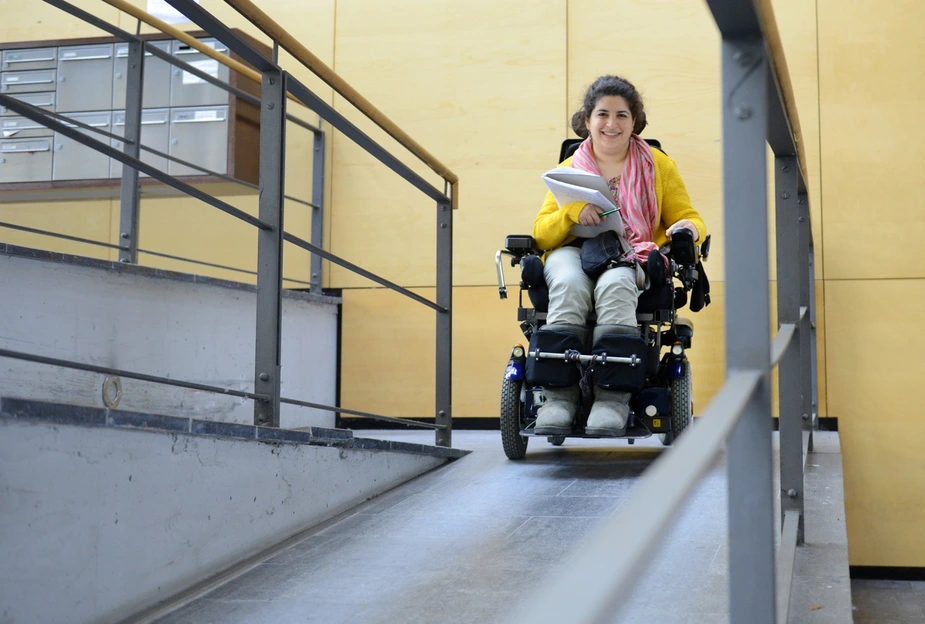The wheelchair-friendly university
People with disabilities at the Humboldt-Universität in Berlin
The wheelschair-friendly university
People with disabilities at the Humboldt-Universität in Berlin
Although it is commonplace for people with disabilities to go to university, it is still fraught with obstacles. Students living with impairments receive much everyday support at the Humboldt-Universität (HU) in Berlin. An accessible campus like Campus Adlershof enables young people like Nassim Dadkhah to study.
Her warm and friendly brown eyes laugh at me and her cheerfulness and optimism are contagious. Nassim Dadkhah was born in Münster and is now in her second semester as a master’s student in psychology at the Humboldt-Universität in Berlin. This is only worth mentioning because Nassim got tetraparesis when she was two years old. She can hardly move her arms or legs and has to rely on a wheelchair. She tells us why the study of psychology intrigued her the most: “I am a creative person and have to solve many problems in my own life. I think that is a good requirement to help other people.”
Before she could start her graduate studies, Nassim Dadkhah and her mother visited the HU’s counselling service to speak with Jochen O. Ley. Ley is the consultant for students with disabilities and chronic diseases, and head of the university’s counselling department. He is responsible for about 300 students with disabilities. The HU has a total of 1,500 students with chronic diseases or disabilities. According to Ley’s estimates, about 300-400 of these students study on Campus Adlershof. Chronic diseases can also include diabetes or mental health issues. They are supported with admissions and are eligible for hardship exemption: five percent of the places in a course are given out based on a quota. Moreover, the so-called “disadvantage compensation” includes writing support, longer exam times or the presence of a trusted chaperone. Jochen O. Ley advises students on these matters and is responsible for the entire inclusion process at the university like monitoring and improving accessibility of buildings. Ley is also the advisor for refugees who study at the HU.
About 100 refugees were registered as guest students during the winter term. They can earn course credits which can be included in a later application. Starting in the summer term, there will be a mentorship programme aimed at giving refugees an insight into German academic life and education system and helping them to meet people.
Jochen O. Ley’s office is in the HU’s main building on Campus Mitte, but he offers regular office hours at Adlershof which he enjoys: “It is so cosy. We all know each other personally and everything is close by. I think I’d say it’s much smoother.” The campus in Aldershof has a crucial advantage for Nassim Dadkhah: it is the HU’s most modern campus and everything is made completely accessible by ramps, automatic doors, and lifts. At least those barriers were not what stood between her and her wish to study psychology at the HU. “Yes,” she nods and laughs, “I don’t have any problems in this regard. That was very different at my school. I have everything I need. It’s functional, modern, and cosy. And I really don’t need any bric-à-brac.” What were the challenges at university? “I have a lot of things that I have to organize. Like the shuttle service.” That is one of things the university does not take care of. However, Dadkhah receives financial support as part of the study assistance and the benefits of the “disadvantage compensation”. She takes her exams in a separate room and has more time to write them. Nassim Dadkhah is very ambitious and handles all the challenges with ease: “I really enjoy studying and I am happy that I am able to do it here. In another country, I might not be able to.”
By Jördis Götz for Adlershof Journal
www.hu-berlin.de/de/studium/beratung/jol
